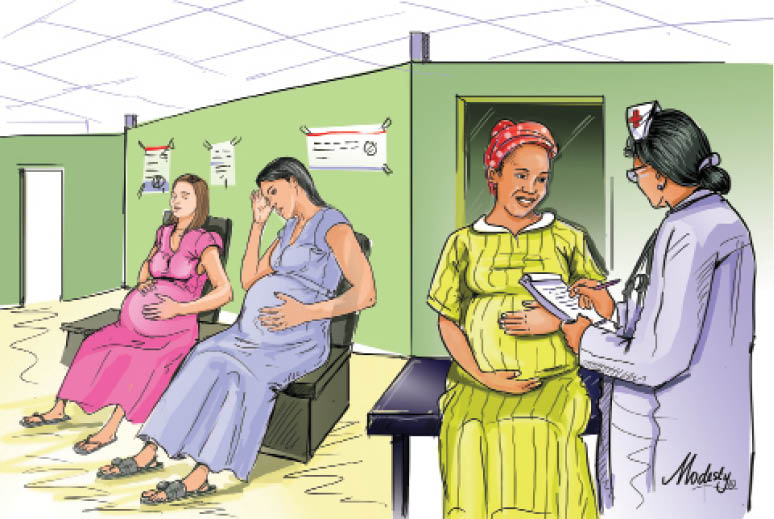Ways to prevent anemia in pregnancy
Ahmed, 40, recalls that his wife was admitted in the hospital a number of times during her third pregnancy because she was diagnosed with a condition called anemia in pregnancy. She had gotten pregnant in quick succession and while she didn’t experience it in her first two pregnancies, the condition reared itself in the third. […]

Ahmed, 40, recalls that his wife was admitted in the hospital a number of times during her third pregnancy because she was diagnosed with a condition called anemia in pregnancy. She had gotten pregnant in quick succession and while she didn’t experience it in her first two pregnancies, the condition reared itself in the third.
“My wife got better after treatment and dietary changes but I learnt it is a serious condition that has led to the death of some pregnant women and their babies whether it is their first pregnancy or if they have had other pregnancies before,” he told Daily Trust.
When a pregnant woman has anemia, her blood doesn’t have enough healthy red blood cells to carry oxygen to her tissues and to her baby.
Anemia can leave the pregnant woman feeling tired and weak, and if untreated, can increase the risk of serious complications such as preterm delivery.
Experts said anemia can develop during pregnancy when the body doesn’t have enough iron to produce adequate amounts of hemoglobin; the protein in red blood cells that carries oxygen from the lungs to the rest of the body. This type of anemia called iron deficiency anemia is the most common cause of anemia in pregnancy.
Anemia in pregnancy also occurs when pregnant women don’t get enough foliate (the vitamin found naturally in some foods like green leafy vegetables) from their diet. When that happens, the body can’t make enough normal red blood cells to transport oxygen to tissues throughout the body. This type is called Foliate-deficiency anemia. Manmade supplements of foliate are called folic acid.
It also develops when a pregnant woman doesn’t get enough vitamin B12 from her diet. When a pregnant woman doesn’t get enough vitamin B12 from her diet, her body can’t produce enough healthy red blood cells. Women who don’t eat meat, poultry, dairy products, and eggs have a greater risk of developing vitamin B12 deficiency, which may contribute to birth defects, such as neural tube abnormalities, and could lead to preterm labour, medical experts at WebMD said.
According to Dr Victor Ohenhen, a Consultant Gynaecologist and Obstetrician, anaemia in pregnancy is a disorder that may occur in pregnancy because the number of red blood cells and the oxygen carrying capacity is insufficient to meet physiological need.
Dr Ohenhen who is also the Head of the Department of Obstetrics and Gynaecology Central Hospital, Benin, said the World Health Organisation (WHO) describes anaemia as a situation whereby in pregnancy, the haemoglobin concentration is below 11 grams per deciliter.
“The incidence of anaemia varies widely from 40 to 80 percent in the tropics compared to between 10 to 20 percent in the developed world. It contributes to almost 20 percent to maternal deaths in third world countries,” he said.
The gynaecologist said causes of anaemia in pregnancy are basically in two forms; physiological and pathological.
He said: “Physiological anaemia in pregnancy is a situation where the increase in body fluid relative to the red blood cell mass causes dilutional effect. This is usually often seen around 32nd week of pregnancy.
“Pathological anaemia is a situation where there is deficiency of iron, folic and vitamin B12 deficiency. Iron deficiency is the common anaemia seen in pregnancy.”
He added that other causes of pathological anaemia include acute haemorrhage, chronic haemorrhage resulting from hookworm infestation, sickle cell anaemia, immune-deficiency states like HIV and tuberculosis among others.
Dr. Ohenhen identified some of the risk factors of developing anaemia in pregnancy as, frequent pregnancies (not spacing child birth), teenage pregnancy, cultural and religion practices and being a third world country with low economic status.
“Another risk factor is poor dietary intake by pregnant women during pregnancy; the diet could be rich but the mode of cooking (like over cooking of green vegetable) that makes it ineffective,” he said.
He added that there are some religious and cultural practices in which people are not allowed to eat beef, snail and other cheap sources of protein, iron and other vital minerals that are helpful in iron intake and absorption.
Dr. Ohenhen said for effective prevention, there should be adequate sensitization and education of the girl child about anaemia in pregnancy in order to eliminate ignorance about the disorder.
“There should be empowerment of the girl child, family planning and supplementary iron therapy during pregnancy and eradication of hookworm infestation,” he said.
The medical expert said anaemia in pregnancy is treated when the underlying disorder is promptly managed, adding that treatment should be preceded by accurate diagnosis of causes, type of anaemia and optimizing the haemoglobin level.
“Also there should be a realistic, balanced diet that includes iron, protein vitamins and eradication of infection through appropriate antibiotic cover.”
Dr. Ohenhen noted that the choice of therapy depends on the severity of anemia or the duration of pregnancy and time available for delivery.
“We use iron therapy taken in ferrous form because it is easily absorbed in the body, but if the anaemia is so severe and the haemoglobin concentration is less that 7 percent, blood transfusion is necessary.”
He advised Nigerians to seek health education saying things needed for healthy living like, crayfish, liver, beans, vegetables are cheap and common.
He also stressed the need to avoid junk food and register early during pregnancy in appropriate health centres where antenatal care services are offered.
